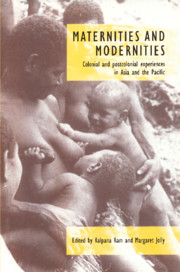Book contents
- Frontmatter
- Contents
- List of illustrations
- Notes on contributor
- Acknowledgements
- Map 1 Location of countries and regions in Asia and the Pacific discussed in this volume
- Introduction Colonial and postcolonial plots in histories of maternities and modernities
- 1 Shaping reproduction: maternity in early twentieth-century Malaya
- 2 Modernizing the Malay mother
- 3 ‘Good wives and mothers’ or ‘dedicated workers’? Contradictions of domesticity in the ‘mission of sisterhood’, Travancore, south India
- 4 Maternity and the story of enlightenment in the colonies: Tamil coastal women, south India
- 5 The dai and the doctor: discourses on women's reproductive health in rural Bangladesh
- 6 Other mothers: maternal ‘insouciance’ and the depopulation debate in Fiji and Vanuatu, 1890–1930
- 7 Just add water: remaking women through childbirth, Anganen, Southern Highlands, Papua New Guinea
- 8 From sisters to wives: changing contexts of maternity on Simbo, Western Solomon Islands
- Epilogue Maternal experience and feminist body politics: Asian and Pacific perspectives
- Index
8 - From sisters to wives: changing contexts of maternity on Simbo, Western Solomon Islands
Published online by Cambridge University Press: 06 July 2010
- Frontmatter
- Contents
- List of illustrations
- Notes on contributor
- Acknowledgements
- Map 1 Location of countries and regions in Asia and the Pacific discussed in this volume
- Introduction Colonial and postcolonial plots in histories of maternities and modernities
- 1 Shaping reproduction: maternity in early twentieth-century Malaya
- 2 Modernizing the Malay mother
- 3 ‘Good wives and mothers’ or ‘dedicated workers’? Contradictions of domesticity in the ‘mission of sisterhood’, Travancore, south India
- 4 Maternity and the story of enlightenment in the colonies: Tamil coastal women, south India
- 5 The dai and the doctor: discourses on women's reproductive health in rural Bangladesh
- 6 Other mothers: maternal ‘insouciance’ and the depopulation debate in Fiji and Vanuatu, 1890–1930
- 7 Just add water: remaking women through childbirth, Anganen, Southern Highlands, Papua New Guinea
- 8 From sisters to wives: changing contexts of maternity on Simbo, Western Solomon Islands
- Epilogue Maternal experience and feminist body politics: Asian and Pacific perspectives
- Index
Summary
Introduction
Maternity is more than a simple dyadic relationship, for it necessarily reflects, and is constituted by, other social relations. This chapter explores the changing contexts of maternity during the twentieth century on Simbo, Solomon Islands (see Map 5). At the turn of the century, women experienced maternity within an ethos dominated by ancestor veneration of which, for present purposes, headhunting was a major feature. In this situation, the single most important gendered relationship was that between classificatory opposite-sex siblings {luluna). Women were viewed primarily as sisters rather than wives. Today, luluna relationships remain significant, albeit in new ways, but Christian marriage is held to be the most important adult gender relationship. Maternity ideally occurs within marriage, as always – the critical difference now is that a woman's husband is seen as having control over her and their children. These alterations in kinship relations were precipitated by local responses to colonial and postcolonial practices, in particular those associated with Christian conversion.
The transformation of the contexts within which maternity occurs means that its significance for women has varied historically. Women today, as Christian wives and mothers in an environment of high (albeit declining) fertility rates, consider themselves unduly burdened (Dureau 1993, n.d.a). By contrast, pre-Christian women exercised autonomy in their modes of fertility limitation. However, they experienced problems with low rates of fecundity and child survival. Infractions of reproductive norms were punished by violent reprisals at the hands of luluna.
- Type
- Chapter
- Information
- Maternities and ModernitiesColonial and Postcolonial Experiences in Asia and the Pacific, pp. 239 - 274Publisher: Cambridge University PressPrint publication year: 1998
- 8
- Cited by



